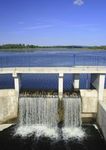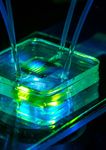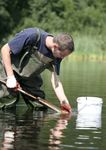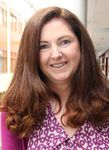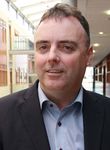Water Institute Dublin City University - Water Institute
←
→
Page content transcription
If your browser does not render page correctly, please read the page content below
DCU Water Institute The Water Challenge Today, water is the most valuable and vulnerable resource globally. There are many challenges and opportunities, both national and internationally, that can be addressed through the delivery of the vision of the Water Institute. Global water demand is expected to increase 22% by 2030. According to the United Nations, almost 3 billion people in 48 countries will face water scarcity by 2025. Climate change is affecting weather patterns, the water cycle in particular, and as a result many regions are seeing amplifications in floods, droughts and hurricanes. According to the World Health Organisation (WHO, 2012) 1 million people die every year from diseases directly attributable to unclean water with 90% of those being children under the age of 5, mostly in developing countries. With Irish population growth forecast at an average rate of 2% per annum, national demand is set to increase. Coupled with this increased demand, is the issue of poor infrastructure. Our current water infrastructure sees approximately 41% of treated water being lost through leakage. We are also facing numerous issues with water quality & security, flooding, water treatment costs and public usage costs. The Water Institute (WI) can address these issues through multidisciplinary, multi-partner advances in technology, along with governance and management. The solutions will lead to sustainable water resources for everyone, with translation potential globally – with Ireland as a leader. About Us In 2013, the decision to establish the WI was made in recognition of the key emerging need for a water- focused research institute to address the national and global water challenges. The DCU Water Institute is a technology-focused institute that generates knowledge and informs decision-making towards more sustainable use of our water resource. The DCU WI performs research, builds institutional capacity and provides advisory services under five thematic areas: energy, water and health, risks and security, marine and sustainable agriculture. These themes are underpinned by technology developments in scientific and engineering domains and driven by policy requirements and water governance. Through applied research and policy consultation, capacity-building in individuals, communication to influence private and public sectors, and linking across sectors, DCU WI aims to stimulate the development of innovative technology-based solutions to our water-related challenges. In 2012, DCU launched its strategic plan, “Transforming lives and societies” outlining initiatives in education, research and innovation. DCU WI vision aligns with the four Core Principles of the strategic plan: Transformation, Enterprise, Translation and Engagement, and is politically neutral, as well as nationally and internationally active. The DCU WI has greater than 30 academic principal investigators with a wide-range of professional experience that enables us to form strong multi-disciplinary teams. We welcome opportunities for collaboration with partners from business; academia and government, to better understand and manage our water resources into the future. Prof. Fiona Regan Director DCU Water Institute
Our Vision DCU Water Institute aims at addressing national, international and global water resource problems through excellence in research, education and innovation in water science, technology, management and governance. Our vision is to provide informed leadership decisions and sustainable action, using advanced technology and data analytics in a multidisciplinary dynamic research environment. We will achieve this vision through collaboration between WI members, government, industry, partner academics and agencies and identify opportunities for knowledge transfer. Our Goals Our goals are to improve and advance basic knowledge of physical, chemical, biological and engineering processes in aquatic systems; to enhance the understanding of human interactions and attitudes with water; to develop and promote improved methodologies for water management and, to inform policy based on a foundation of science, engineering and computing technologies. The drive for the DCU WI reflects population increase and economic growth the globe has seen over the past years, and our changing water needs. The Water Institute has three main goals: • Safe, secure drinking water; • Healthy aquatic ecosystems; and • Reliable, energy efficient, quality water supplies for a sustainable economy
Our Expertise
The DCU Water Institute is a cross-faculty initiative of research and education on water. It aims to work
with all stakeholders – a quadruple helix of academia, industry, agency and society - in its research and
development work. This research and capacity building work aims to develop solutions to national and
global problems in water. We specialise in technological developments across science, engineering and
computer science domains, with strong communications focus, as well as policy and business drivers.
These areas are reflected in our academic members in DCU – across all faculties of the University.
Our research is technology focused in a policy rich environment and falls under five main thematic
research and development pillars (Figure 1):
1. Energy e.g. 4. Marine e.g.
• Economics of water usage • Biotechnology and discovery
• Water Energy Challenge • Aquaculture and fisheries
• Invasive species, ballast water
2. Water and Health e.g.
• Waste water and treatment efficiency 5. Sustainable Agriculture e.g.
• Emerging contaminants • Nutrients and run-off
• Coastal Eutrophication
3. Risks and Security e.g. • Water re-use
• Water Scarcity & Security
• Real time monitoring
• Drinking WaterTechnology Focus - Policy and Enterprise drivers
(Figure 1)
Policy &
Water and Risks
Energy
Health Secu
Economics of Wastewater & Chem
water usage treatment efficiency thre
Water in biofuel Bio-wa
Pathogens
production detection /
Water Emerging Real-
energy challenge contaminants monit
Industry water
Scarcity Pollu
usage
Wind and Ocean
Water safety Drinking
energy
Techn
Autonomous sensors,
Data analytics Engine
Engin
Multimodal Sensors
and models syste
syst
& sensor networks& Governance
s and Sustainable
Marine
urity Agriculture
mical Biotechnology Nutrients &
eats & discovery run-off
arfare
Ocean energy Algal blooms
pathogens
-time Aquaculture & Coastal
toring fisheries Biomass eutrophication
Water Catchment manage-
ution
quality ment & drainage
Invasive species, Water use
g water
Ballast Water and re-use
nology
eered
neered Materials Treatment
ems
tems Science technologiesBiographies & Expertise
Professor Fiona Regan
Fiona Regan, Associate Professor in Environmental Sensing since 2009,
has driven the initiative to establish the Water Institute at DCU since January
2013. Fiona studied Environmental Science and Technology at the Institute
of Technology in Sligo and graduated in 1991. After completing her PhD in
analytical chemistry in 1994, and postdoctoral research in optical sensing in
1996 at DCU, she took up a position at Limerick Institute of Technology as
lecturer in Environmental and Analytical Science. In 2002 Fiona returned to
the School of Chemical Sciences, DCU, as a lecturer in analytical chemistry,
in 2008 she became senior lecturer and in 2009 became the Beaufort PI in
Marine and Environmental Sensing. She established the Marine and
Environmental Sensing Technology Hub (MESTECH), DCU in 2010. As Director
of MESTECH she also coordinates the Marine ICT SmartBay research activities
under PRTLI V, leading the National Infrastructure Access Programme (NIAP)
and the International SmartOcean Graduate Enterprise Initiative (ISGEI).
Expertise
Fiona’s research focuses on environmental monitoring using sensing and
passive sampling. She has special interest in priority and emerging
contaminants as well as the establishment of decision support tools for
environmental monitoring using novel technologies and data management
tools. Her work includes the areas of separations and sensors, materials for
sensing and anti-biofouling applications on aquatic deployed systems.
Dr Dermot Brabazon
Dr Dermot Brabazon (BEng, CEng) completed his PhD in the area of Near Net
Shape Forming (NNF) at UCD before commencing as a lecture at Dublin City
University in February 2000. Since then, he was promoted to Senior Lecturer
in 2007, appointed as Head of School and from 2009 to 2012 as Associate Dean
for Research within the Faculty of Engineering & Computing. Since 2012, he has
been director of the Advanced Processing Technology Research Centre at DCU.
Dr. Brabazon was conferred with the DCU President’s Award for Research in
January 2009. He has Chaired the Mechanical and Manufacturing division of
Engineers Ireland and the IMechE (RoI), is currently a member of Engineers
Ireland Council & Industrial Liaison committees, and was Elected as steering
committee member for the European Materials Forming Society. Dermot is
also a Principle Investigator within the Irish Separation Science Cluster and
the Water Institute at DCU.
Expertise
Dr Brabazon’s research expertise is in the areas of Near Net Shape Forming
(NNF), Laser Processing, and Separation Science. Specific areas of his NNF
expertise include semi-solid metal processing, powder processing, and 3D
printing/Additive Manufacturing. Laser processing for micromachining,surface modification and chemical functionalisation are specialty areas of Dermot’s research over the last ten years. This research has been applied with collaborating companies for increasing the life time of high temperature die tooling, mining drill materials, and biomedical implants. Since 2008, Dermot has applied these advanced processing technologies to the fabrication of enhanced separation systems which are used for separation and identification of chemical and biological species. Professor Pat Brereton Professor Pat Brereton is a senior lecturer in the school of Communications at Dublin City University. Pat has an academic background in all aspect of film studies and new media literacies. His research focuses on representations of: ecology, science, war, religion and national identities among others. He was a previous director of SIM and continues to be an active member while carrying out his duties as Associate Dean for Research in the Faculty of Humanities and Social Sciences. His research adapts a broad interdisciplinary approach to textual analysis, together with a growing involvement with reception study, as evidence of the symbiotic relationship between media texts and audiences. Expertise Eco-film studies specialist who examines the power of cinema and media generally in promoting environmental issues. From completing my PhD and my subsequent book publication ‘Hollywood Utopia: Ecology in Contemporary American Cinema’ (Intellect 2005) Pat has remained very actively involved in examining the power of audio visual media in promoting all forms of environmental and sustainable agendas. Over the years he has published extensively in a wide range of journals and edited book volumes on the subject and is currently working on a book for Routledge on ‘Environmental Ethics and Film’. Water and its representations remains a feature of Pat’s research and currently he has a number of PhD students examining communication strategies used to promote Environmental issues including Climate Change and Clean Tech Industries. Dr Brian Corcoran Dr Brian Corcoran is a Lecturer in the School of Mechanical and Manufacturing Engineering at Dublin City University. A graduate of Bolton Street, College of Technology and of Dublin City University, he is a Chartered Engineer and was a warded his Ph.D. in 2003. He is the Associate Dean of Education in the Faculty of Engineering and Computing. Brian currently lectures on Thermo-Fluids, Sustainable Water Systems and Pneumatics at DCU. Expertise Brian’s research interests include Sustainable Water Systems, Sustainable Energy Systems, High Purity Water Systems, Wireless Environmental Sensors and Lab-on-a-Chip projects. He has collaborative links both nationally and internationally and an excellent research track record. He has industrial experience of the design, installation, commissioning and validation of high purity water systems for Pharmaceutical and Semi-Conductor industries.
Dr Mark Cummins Dr Mark Cummins is a Lecturer in Finance at the Dublin City University Business School and Programme Chair of the Graduate Certificate and MSc in Sustainable Energy Finance and the Graduate Certificate in Management (Sustainable Energy Finance). He holds a PhD in Quantitative Finance. Mark is published in targeted international journals such as Applied Energy, Land Use Policy and the Journal of Energy Markets, as well as international finance journals such as Journal of Financial Markets and Quantitative Finance. Mark has previous industry experience working as a Quantitative Analyst within the Global Risk function for BP Oil International Ltd., based in Canary Wharf, London. As part of the Risk Quantitative Analysis team, his primary responsibilities included derivatives and price curve model validation and development, with a global remit across BP’s oil, gas, power, commodities and carbon emissions activities. Expertise Mark’s research interests lie in a number of areas spanning numerical finance and econometrics. He has a keen interest in a broad range of energy modelling, derivatives, risk management and trading topics. He also has a growing interest in the area of sustainable energy finance, with particular focus on the emissions markets and real options valuation of resource projects. Linked to Mark’s industry experience, he holds additional interests in the areas of model risk and model validation. Dr Stephen Daniels Dr. Stephen Daniels is a faculty member of the School of Electronic Engineering, at Dublin City University. He is currently serving as Director of the Sustainable Economies and Societies Research and Enterprise Hub and is executive director of the National Centre for Plasma Science and Technology. Additionally, he is Director of the Energy and Design Laboratory, the Surface Science Laboratory, and the Nanomaterials Processing laboratory at DCU, a multidisciplinary research team with extensive expertise in plasma technology and energy systems. He has a significant involvement in several large scale research initiatives and centres, including the Precision strategic research cluster, the Biomedical Diagnostics Institute, and the Marine and Environmental Research Hub (MESTECH). To date Stephen has authored more than 90 peer reviewed journal publications, 10 patents, and over 100 international conference contributions. Stephen holds a B.Eng in Electronic Engineering and Ph.D from DCU and has over 10 years industrial experience, including 7 years as a technologist with Applied Materials and he maintains significant national and international linkages within the broader plasma and semiconductor processing industry. Stephen has founded several successful technology companies, including Qualflow Systems Ltd, Lexas Research, Arann Healthcare and Sonex Metrology Ltd. Stephen has also been the recipient of numerous awards for innovation. Most notably, in 2012, Stephen was awarded Enterprise Ireland’s Manufacturing, Engineering and Energy Commercialisation Award he received this award for his commitment to commercialisation.
Expertise Stephen currently leads a research of team of 14 PhD students and 8 postdoctoral researchers and with active interests in plasma metrology and control for nanomanufacturing, atmospheric plasma source design and diagnostics for decontamination and sterilization, plasma surface engineering for biosensors, synthesis of thin film materials for photonic devices, and design and characterisation of energy efficient devices. In collaboration with researchers from the RCSI, Stephen is developing new plasma technology for the decontamination of environmental sources for healthcare-associated infections, with work funded by the HRB and SFI. Dr Yan Delauré Dr Yan Delauré is a lecturer in Fluid Mechanics in the School of Mechanical and Manufacturing Engineering at Dublin City University (DCU). He received his PhD from University College Cork in 2001 and holds a Diplôme d’Ingénieur in Aeronautical Engineering from ESTACA, France and a M.Sc. in Marine Resources Development and Protection from Heriot Watt University, Scotland. Before joining DCU he worked for a period of five years as a research engineer at the Hydraulics and Maritime Research Centre in Cork until 2001 and held a one year post-doctor- al research position at Trinity College Dublin. Since 2002, he has lead a number of industry based applied research projects and has established a fundamental research activity with funding from Science Foundation Ireland, the Irish Research Council, Enterprise Ireland and the Environmental Protection Agency. He has co-authored 30 articles in peer-reviewed journals and conference proceedings. Expertise Yan’s primary research interest is in computational flow modelling and in particular multiphase flow modelling for applications in process aeration and pumping of incompressible single phase and solid laden flows. He has developed in-house codes and worked with a range of commercial and open source solvers including parallel solvers for high performance computations. Professor Dermot Diamond Professor Dermot Diamond received his Ph.D. and D.Sc. from Queen’s University Belfast (Chemical Sensors, 1987, Internet Scale Sensing, 2002), and was Vice-President for Research at Dublin City University (2002-2004). He joined the School of Chemical Sciences at DCU in 1987, and has led a series of large-scale research initiatives since then. He has published over 300 peer-reviewed papers in international journals, is a named inventor in 18 patents, and is co-author and editor of four books. He is director and founding member of the National Centre for Sensor Research (www.ncsr.ie) at Dublin City University, possibly the largest and most successful centres of its type worldwide, with over 250 researchers, and income in excess of €100 million. He In 2002, he was awarded the inaugural silver medal for Sensor Research by the Royal Society of Chemistry, London, and in 2006 he received the DCU President’s Award for research excellence. In May 2014, in recognition of his academic contributions and achievements, he was admitted to Membership of the Royal Irish Academy.
He is a PI in four FP7 projects, focused on distributed environmental sensing, fundamental materials chemistry and is coordinating partner of the EU-Australia International Network ‘MASK’, funded under the Marie Curie IRSEs programme. He is a Funded Investigator through the SFI-funded INSIGHT Centre, the largest single research initiative undertaken by Science Foundation Ireland. Expertise Dermot’s research interests are broad, ranging from molecular recognition, host-guest chemistry, ligand design and synthesis, electrochemical and optical chemical sensors and biosensors, lab-on-a-chip, sensor applications in environmental, clinical, food quality and process monitoring, development of fully autonomous sensing devices, wireless sensors and sensor networks. He is particularly interested in the using analytical devices and sensors as information providers for wireless networked systems i.e. building a continuum between the digital and molecular worlds. Samantha Fahy Samantha holds a primary Science degree from NUI Galway (1991), a Masters in Optoelectronics from Queen’s University Belfast (1992), a diploma in Management from Trinity College Dublin (1997) and an MBA from Dublin City University (2010). Samantha has over 20 year of experience in the management and administration of high technology research projects and has developed a deep understanding of research practice gained from working closely with outstanding researchers engaged in complex projects, such as SFI Strategic Research Clusters, which are multi-institutional, multi-disciplinary and have deeply embedded industrial partners. In 2004 Samantha was appointed the Centre Manager for the National Centre for Plasma Science and Technology focusing on the long-term strategic planning for the Centre, including the coordination and submission of major research grants applications and other funding opportunities as well as management of complex budgets over multi-year time frames, liaising with many partners (often with conflicting interests), and successful negotiation of difficult consortium agreements. Earlier in her career (2001 – 2004), Samantha launched and managed a start-up company focused on delivering technology focused education and training programmes tailored to specific industrial requirements. In 2012 Samantha took on the part-time role of Manager of Sustainability at DCU – a new cross University initiative to develop and promote Sustainability across all functions including teaching and learning, research development and innovation, campus management and operations as well at enhancing engagement with external stakeholders. In June 2013 Samantha moved full time to this role. Expertise Samantha has over 20 year of experience in the management and administration of high technology research projects and has developed a deep understanding of research practice gained from working closely with outstanding researchers engaged in complex projects. She currently supports the development and embedding of sustainable solutions across DCU.
Dr Lorna Fitzsimons Dr Lorna Fitzsimons (BEng, PhD) is a Lecturer in the School of Mechanical and Manufacturing Engineering, Dublin City University. Currently, she is coordinator of an Irish EPA Medium Scale project (2013-2015) located between DCU and NUIG. The focus of this project is to benchmark and optimise the resource efficiency of Irish Waste Water Treatment Plants (WWTP) using a multi-faceted approach (LCA, Exergy Analysis and Process Control). Other research projects and interests include desalination, the use of exergy analysis to optimise the energy consumption of water treatment and purification processes (desalination, semiconductor manufacturing Ultra-Pure Water plants, Wastewater Treatment Plants), and several energy efficiency and environmental monitoring projects. She previously worked as a postdoctoral researcher in the Marine and Environmental Sensing Technology Hub (MESTECH) where the focus of her research was environmental monitoring and environmental sensor development. Expertise Lorna’s expertise is in the area of Exergy Analysis and Process Control in relation to water treatment and purification processes. Dr Greg Foley Dr Greg Foley is a chemical engineer with a PhD in membrane filtration from University College Dublin. He also has a master’s degree in chemical engineering from Cornell University and is a former UCD Newman Scholar. He is the author of Membrane Filtration – A Problem Solving Approach with MATLAB, published by Cambridge University Press in 2013. He is the author of over 30 membrane-related papers in international journals including 13 in the top-ranked journal, Journal of Membrane Science. His current research interests are in the development of novel computational methods for ultrafiltration system design and in developing new design methods for pervaporation systems. He has taught for over 25 years in the School of Biotechnology in DCU where he has supervised numerous MSc and PhD students. He is a member of the Environtech University Designated Research Centre in DCU. Expertise Greg’s main area of expertise is in the modelling, analysis and design of membrane systems, especially microfiltration and ultrafiltration.
Ronan Furlong Ronan Furlong is Executive Director of DCU’s recently launched Innovation Campus. Ronan was previously Director of Operations for The Green Way - Dublin’s cleantech cluster, which DCU founded alongside Dublin City Council, Dublin Airport Authority, Dublin Institute of Technology and other regional stakeholders. In the Green Way, Ronan was responsible for strategy, marketing and business development, as well as the facilitation of major industry led cleantech demonstration projects such as Glen Dimplex’s roll out within the city of their new smart electric thermal storage innovation ‘Quantum’. Ronan is a recent graduate of DCU’s Certificate in Sustainable Energy Finance, has a Bachelor’s degree in Architecture from UCD, as well as a Diploma in Construction Project Management and a MBA from Trinity College. Expertise As Executive Director of the new innovation campus, Ronan will be responsible for the physical refurbishment and sustainable development of the campus, the marketing and letting of existing and new facilities on site, the development of university-industry collaborations and the establishment of a like-minded community of companies, researchers, institutes, students and external stakeholders, all of whom will be focused on the long term development of the campus as Ireland’s centre of excellence for research, development and innovation in areas such as cleantech, health technologies and ICT. Dr Niamh Gaynor Dr Niamh Gaynor is a lecturer in the School of Law and Government in Dublin City University where she is currently also Director of Teaching and Learning. Niamh also serves as an external examiner for Kimmage Manor Development Studies Centre. Niamh was awarded her PhD in Political Sociology from NUI Maynooth in 2008 and she has worked in DCU since that time. Previously she worked both in international development, principally in Africa, and in community development in Ireland. She has worked in over 15 countries in Africa and her current research project on local governance and peacebuilding in the Great Lakes region of Africa, which is funded by DCU, Trócaire and the Royal Irish Academy, focuses on governance of local resources including water in Burundi, the Democratic Republic of the Congo and Rwanda. Expertise Niamh’s research interests include the politics of inequality and development, citizen participation and democracy, and local governance, including governance of natural resources.
Dr Carolyn Hughes Carolyn is a Business Development Manager within Invent - DCU’s Technology Transfer Office and works closely with DCU’s Research Hubs and external industrial and commercial partners to develop collaborations and commercial exploitation of DCU’s innovative technologies through licensing and the development of new start-up companies. Carolyn’s portfolio is centred around the Sustainable Economies and Societies Research Hub which covers a broad range of research in the sectors of Water, Energy, Engineering and Manufacturing supported by DCU’s underlying expertise in the areas of chemistry, analytical separation science, sensors, novel materials, physics, electronic and nanomaterials, plasma technology and engineering. Expertise Carolyn’s expertise lies in commercialisation of innovative technologies. Carolyn has practical experience in technology licensing, the formation of new start-up companies and structuring effective collaborations between industry partners and DCU. Prior to joining DCU, Carolyn held a variety of commercial roles in industry spanning product management, new product introduction, business development and commercialisation management within the semiconductor, instrumentation and industrial gases sectors. Carolyn holds a B.Sc. (Hons) degree in Chemistry and a Ph.D. in Physical Chemistry from the University of Manchester, UK. Dr Brian Kelleher Dr Brian Kelleher received a PhD in environmental chemistry from the University of Limerick in 2001 under the supervision of Dr Tom O’Dwyer. He then managed a large scale research project that demonstrated the feasibility of using fluidised bed combustion for the transformation of agricultural waste to energy. In 2002 he joined Prof William Kingery in Mississippi State University as a post-doc researcher to study soil-enzyme dynamics and the growth mechanisms of marine gas hydrates. In 2004 he took up a post-doc position with Prof. Andre Simpson of the University of Toronto where he worked on the application of advanced Nuclear Magnetic Resonance (NMR) and hybrid techniques to study the complex mixtures in soil, water and sediment natural organic matter (NOM). In 2005 he took up the position of lecturer in the School of Chemical Science in DCU. Expertise Brian’s’ research objective is to address environmental questions at a molecular level. To do this he employs analytical techniques such as advanced NMR and compound specific stable isotope mass spectrometry and works closely with microbiologists, geologists and mathematicians. His research interests include the characterisation of natural organic matter (NOM) in water (dissolved organic matter), soil and sediments; the contribution of NOM to the carbon cycle; the sequestration of CO2 by soil, water and marine microorganisms; marine methane seepage, gas hydrates and their related chemical, microbiological and physical features; hydrocarbon degradation and detection; palaeoclimate information derived from soil/sediment biomarker analysis and the search for indications of life on Mars.
Professor Tia Keyes Tia Keyes is professor of physical chemistry at the School of Chemical Sciences, where she has been a member of academic staff since 2002. Tia’s research team (https://www4.dcu.ie/inb/) are based between the School of Chemical Sciences and the National Biophotonics and Imaging Platform Ireland (NBIPI) www.nbipireland.ie a multi-institutional initiative established under PRTLI which Tia has led since 2009. Tia was an academic member of The Biomedical Diagnostics Institute and co-node leader (Britain and Ireland) on the Biophotonics4life consortium. She is author/coauthor of over 165 peer-reviewed publications in international journals. Her groups work has featured as 9 journal covers and highlights over the past 6 years. The Keyes group is financially supported through a number of sources including Science Foundation Principal Investigator Programme, Enterprise Ireland, The Higher Education Authority (PRTLI) and the European Union. Expertise Tia’s research interests lie in the fields of molecular spectroscopy & photophysics and in supramolecular & interfacial chemistry. She is particularly interested in applications of these fields to biological problems, including cell imaging/ environmental mapping, cell capture, sensing and membrane mimetics. In the context of water, Tia’s interests lie in sensing and in the development of novel interfacial materials for solar remediation of waste water. Dr Jenny Lawler Dr Jenny Lawler graduated with a BE in Chemical Engineering from University College Dublin, subsequently completing a PhD in the School of Biotechnology at DCU in the area of membrane separations. She worked as an engineering consultant for a number of years on a variety of multimillion euro projects, prior to returning to DCU to take up a lecturing position in bioprocess engineering in 2010, where she was Chair of the MSc in Bioprocess Engineering for three years. She has published her research in high impact journals in the areas of membrane and environmental technologies and water treatment, and serves on the editorial boards of international journals including Separation and Purification Technology, Desalination and Water Treatment, Membranes and Chemical Engineering and Processing. Her research group is currently funded by the Environmental Protection Agency, the Irish Research Council, and Science Foundation Ireland. Expertise Dr Lawler’s research in the water arena focuses on the development of environmental technologies and membrane strategies, including micro-, ultra- and nanofiltration, to environmental problems including water and wastewater treatment systems. She is particularly interested in the targeting of emerging pollutants such as pharmaceuticals and nanomaterials, and she has expertise in the mathematical modeling of bioprocesses, including the application of artificial neural networks. Her research interests are diverse, ranging from the development of phase inversion and electrospun based inorganic-organic hybrid membranes for ultra- and nanofiltration applications, development of nanostructured surfaces for antifouling applications, and the development of nanostructured composites based on grapheme related materials for adsorption and pollutant removal.
Professor Christine Loscher Christine Loscher is currently the Director of Dublin City University’s new Health Technologies Research & Enterprise Hub. She completed her PhD in Immunology at the National University of Ireland, Maynooth in 2000 and was awarded a Health Research Board Fellowship to pursue her postdoctoral studies at Trinity College Dublin. In 2003, she moved to the Institute of Molecular Medicine at St James Hospital to continue her research and then was appointed to a permanent academic position at DCU in 2005. She is the Director of the BioAT Programme, a €5.6M multi-disciplinary training and research programme spanning 6 academic institutions. She led this initiative for DCU on behalf of 6 institutions and has designed, developed and implemented the programme. She is also Director of the Nano-Bioanalytical Research Facility, a €16M facility currently being built at DCU which is designed to provide a significant infrastructural enhancement to DCU to facilitate new developments in emerging areas at the interface of the science, engineering and technology disciplines. Her diverse roles have provided her with an extensive knowledge of the research landscape and in her current role as Director of the Health Technologies Hub, she is exploring opportunities to develop strategic partnerships by using DCU’s unique research expertise to address Industry’semerging challenges. Expertise Christine established the Immunomodulation Research Group in DCU and her current research at DCU is primarily focused on the “manipulation of the immune response for therapeutic benefit.” Christine has also developed significant expertise in commercial research and industry engagement and has secured over €4M in external funding (€250K directly from industry) for her research. Furthermore, she played a central role in 3 of DCU’s major strategic initiatives under the governments PRTLI 4 and 5 schemes to the value of €28M. She currently holds a number of other strategically important positions within the University. Dr Theo Lynn Dr Theo Lynn is Business Innovation Platform Director at DCU and a Senior Lecturer at DCU Business School, where he teaches strategy and digital marketing at postgraduate level. He is one of the founding PIs of the Irish Centre for Cloud Computing and Commerce and was formerly the Director of the LINK Research Centre at DCU. Dr. Lynn has founded a number of companies incl. Enki Information Systems, Educational Multimedia Group and Atomic Assets, the businesses of which have been acquired by Rochford Brady Group, Intuition and Cambridge University Press respectively. He is currently a Partner in the 30/60 Seed Investment Fund. He advises a number of domestic and international companies. Expertise With his extensive experience in business, Theo will support commercialisation and dissemination activities within the Water Institute as well as acting in business advisory capacity in areas related to governance, marketing, and industry collaboration.
Dr Enrico Marsili Dr Enrico Marsili is a Lecturer in the School of Biotechnology at Dublin City University. Enrico has a doctorate in Chemical Engineering from University of Rome, Italy. He has worked in The Centre for Biofilm Engineering (Montana State University, USA) where he used single species and mixed consortia biofilms for bioremediation and bioelectricity production in Microbial Fuel Cells (MFCs). Enrico has worked on MFCs and electroactive biofilms through his postdoctoral research at BioTechnology Institute (University of Minnesota, USA). In 2008, Enrico joined the School of Biotechnology at DCU as Lecturer (tenured). Since May 2012, he is also Visiting Scientist at Singapore Centre on Environmental Life Sciences Engineering (SCELSE), a new research centre of excellence based at Nanyang Technological University (NTU), Singapore. Expertise Enrico has a keen interest on electroconductive biofilms for biocorrosion and bioelectricity production and has more than 11 years expertise in biofilm engineering and characterization. He is also interested on nanoparticle biosynthesis in biofilms for biomedical and environmental applications. Currently, he is principal investigator on an industry-funded project aimed to develop a novel bioelectrochemical sensor for wastewater. He is co-PI and collaborator on several projects, including a Marie Curie ITN network (Ireland) and a CRP consortium (Singapore). Dr Eilish McLoughlin Dr. Eilish McLoughlin is the Director of the Centre for the Advancement of Science and Mathematics Teaching and Learning (CASTeL) and an academic member of the School of Physical Sciences at Dublin City University (DCU). She is coordinator of the FP7 ESTABLISH project and a member of the coordinating team on the FP7 SAILS project. Eilish was a recipient of the DCU President’s Award for Teaching and Learning and also a recipient of the Teaching Fellowship in 2005 and received a National Award for Teaching Excellence in 2010. She is actively involved in facilitating science teacher education at both pre- service and in-service levels as well as teaching and learning of physics at third level. Her research interests are in the implementation of innovative teaching approaches, such as inquiry based learning and interdisciplinary approaches and the effective use of technology in education for the teaching and learning of physics/science at all levels. She has successfully received funding for her research in science education from national and international funding agencies. She is former chair and current co-chair of the Institute of Physics (IOP) in Ireland Education group and a former member of the IOP Education Board for UK and Ireland and has been the National Coordinator for Science on Stage since 2002. Expertise Eilish’s expertise lies in the research and implementation of innovative teaching approaches, such as inquiry and interdisciplinary approaches and the effective use of technology in education for the teaching and learning of physics/science with and for society.
Dr Aoife Morrin Dr Aoife Morrin’s field of research encompasses electroanalytical device development for environmental and biomedical applications. Specifically, her work entails developing and studying functional and responsive materials with high performances due, for example, to nano-structuring or compositing. Materials of interest include conducting polymers, hydrogels and graphene. Integration of these materials into microfluidic platforms for electroanalytical applications including sensing and chromatography are current topics of research projects underway in her group.Printed electronics as a sensor fabrication technology is another area where Aoife has an active research interest. Expertise Aoife has extensive experience in screen- and inkjet- printing of functional ma- terials for sensor applications. Printing of these materials for the fabrication of sensing devices based on both paper and plastic have been shown to have unique behaviours and are being applied to several specialised electrochemical sensing applications spanning areas such as skin gas monitoring, catecholamine detec- tion in urine, ammonia refridgerant monitoring, glucose monitoring in sweat and E. coli detection. Dr Anne Morrissey Dr Anne Morrissey graduated with a Chemical Engineering degree from University College Dublin and a PhD from NUI Galway. She has worked in and been carrying out research in the area of environmental protection since 1996. Prior to joining DCU, she worked with Smurfit Kappa group for more than 10 years in a variety of roles, including Environmental Manager with Smurfit Corrugated Cases. She has received funding to date from a variety of funders including Science Foundation Ireland, FP7, the Environmental Protection Agency and QUESTOR, and has supervised seven research students to completion. She was PI on two projects as part of the ATWARM FP7 project (Marie Curie ITN, No. 238273) and is currently the project manager of an EPA project focusing on the use of graphene related materials for water treatment. Expertise Since joining Dublin City University as a full time lecturer, Anne has been directing research in the area of water and wastewater treatment, with a particular emphasis on the removal of emerging contaminants from water by developing novel removal methods using adsorption, photocatalysis and a combination of these. Recent work is focussing on using graphene and graphene composites for water treatment. Professor Ronnie Munck Professor Ronnie Munck obtained his PhD at the University of Essex and is currently Head of Civic Engagement at DCU and visiting professor of international development at the universities of Liverpool and St Mary’ Nova Scotia. He has authored or edited more than 25 books on various topics related to globalisation, international development and social movements as well as over 150 peer reviewed academic journal articles. Some of his books have been translated into French, Spanish, Portuguese, Italian, Arabic, Korean, Turkish Chinese and Japanese. He serves on the editorial boards of a number of
international journals including Globalizations, Global Social Policy, Global Labour, Labour History, Global Discourses, Review and Latin American Perspectives. Professor Munck was coordinator of the Irish Aid funded inter-university project the Irish African Partnership for Research Capacity Building and is now Chair of the Irish Aid funded national platform for development studies, the Development Studies Association of Ireland. Expertise Professor Munck has researched widely in the area of community development and environmental issues as well as in the broader areas of globalisation and social exclusion his work focuses on. Projects he has led include a major study of waste management and community development in Liverpool funded by the Rowntree Foundation and the first all-Ireland study of waste management funded by the EU cross border fund. He has led the social science element of the Irish Aid funded Water is Life inter-disciplinary project resulting in a socio-spatial survey and an academic book to be published by Zed Books on the topic. His work has always engaged closely with the user communities and that has included the EPA, Dublin City Council, Merseyside Local Authority, Water Ministry, Uganda and many others. He is currently completing a new book Water and Development: An Africa Perspective Dr Pádraig Murphy Dr Pádraig Murphy is Lecturer in Communications at Dublin City University, Programme Chair of the MSc in Science Communication and Director of the DCU Societal Impact Platform. His teaching and research interests include science communication, Science and Technology Studies, public participation in, and public and media representations of, science and technology and Responsible Research and Innovation policy. An environmental science graduate, Dr Murphy’s background also includes content management in elearning. He is author of Biotechnology, Education and Life Politics: Debating Genetic Futures from School to Society (Routledge, 2014). Dr Murphy is also coordinator of the Celsius research group at DCU and part of the Management Board of DCU Community Knowledge Exchange, a ‘science shop’ based in DCU. He is also co-chair of Campus Engage and Work Package Leader on the Framework 7 project ‘PERARES’, a project which connects community-based research across Europe. Expertise His current research and writing has focused on deliberative and participatory dialogue models for biotechnology, nanotechnology, and sustainable technologies, as well as how such technologies can be part of a policy of anticipatory governance. He managed a citizens’ jury on the trialling of the GM potato in Ireland - the #gmpotato Community of Inquiry project - funded by the Irish Environmental Protection Agency.
Dr Kieran Nolan Kieran Nolan carried out his PhD at York University, Toronto Canada, under the supervision of Professor Clifford C. Leznoff. After completing his PhD in 1996 Kieran worked in both the pharmaceutical and packaging industry until 1998 when he joined the NCSR at DCU. In 2001 Kieran became a Lecturer in the School of Chemical Sciences at DCU and Senior Lecturer in 2012. Kieran was a founding member of the DCU UDRI Environtech, that was established in February 2011 and in October 2014, Kieran became the Head of School of Chemical Sciences at DCU. Expertise The Nolan research group has been intensively involved in the area of environmental sciences since its inception in 2001. In the past, Dr Nolan’s group has specialized in the development of new chemoreceptors for application in environmental sensing and extraction of heavy metals from waste streams. More recently, the Nolan group has turned its attention to the development of new ‘Green’ synthetic technologies, with particular emphasis on the development of new energy and water efficient microflow photochemical reactors. The Nolan group also specialises in the design and preparation of new photocatalysts and integrated photocatalytic composites such as dye-TiO2, activated carbon-TiO2, Graphene-TiO2 and mineral-graphene composites for application in the removal of pollutants from industrial waste water streams. Dr Nolan has also supervised/co-supervisor 20 PhD students to completion since 2001. Professor Noel E. O’Connor Noel E. O’Connor is a Professor in the School of Electronic Engineering at DCU and the Academic Director of the Research and Enterprise Hub on Information Technology and the Digital Society. He is a Funded Investigator (FI) in Insight, Ireland’s national Centre for Data Analytics funded by Science Foundation Ireland. Since 1999 Prof. O’Connor has published over 180 peer-reviewed publications, made 11 standards submissions and filed 6 patents. He has graduated 16 Ph.D students and 3 Masters students. He is an Area Editor for Signal Processing: Image Communication (Elsevier) and an Associate Editor for the Journal of Image and Video Processing (Springer). He has edited 6 journal special issues, including Signal Processing: Image Communication, Multimedia Tools and Applications, the Journal of Web Semantics and the Journal of Embedded Systems. He was awarded the DCU President’s Research Award for Science and Engineering in 2010. Also in 2010, he was awarded Enterprise Ireland’s National Commercialization Award for ICT. He is a member of the IEEE, Engineers Ireland and the IET. Expertise Noel’s early research was in the field of video compression, specifically object-based compression in the context of MPEG-4, which subsequently led to an interest in video object segmentation and tracking as well as other aspects of computer vision. With the advent of MPEG-7, he became interested in audio-visual (AV) analysis for content-based information retrieval as well as low-power configurable hardware for AV processing, a key-enabler for
next generation context-aware multimedia sensors. The focus of his current research is in multi-modal content analysis leveraging mutually complementary sensor data sources, for applications in sports, ambient assisted living, digital media, gaming and environmental monitoring. Dr Bríd Quilty Dr Bríd Quilty is a Senior Lecturer in the School of Biotechnology at Dublin City University. A microbiologist, she has a particular interest in the microbiology of water and wastewater. She leads a large multinational research group and current projects include investigations of the microbiological quality of drinking water in rural Uganda in collaboration with the University of Makarere, Kampala and an innovative approach for the photodisinfection of water using novel photosensitisers and sunlight funded by the Brazilian programme Science without Borders. She has close links with industry and is the external representative on the Biological Safety Committee, Pfizer, Grange Castle, Dublin. Expertise Bríd has expertise in areas of Microbiol Ecology, Water Quality, Biological Waste Treatment, Activated Sludge, Bioaugmentation, Pseudomonads, Bacterial aggregation, Photodisinfection. Professor Alan Smeaton Since 1997, Alan Smeaton has been a Professor of Computing at Dublin City University where he has previously been Head of School and Dean of Faculty. Hisearly research covered the application of natural language processing techniques to information retrieval and this broadened to cover content-based retrieval of information in all media, text, image, audio and digital video. From 2007 to 2013 he was Deputy Director of CLARITY: Centre for Sensor Web Technologies, a large multi-site research centre of over 120 researchers, co-funded by Science Foundation Ireland (SFI) which has secured over €35m in competitive research funding over a 5-year period. From 2013 to 2019 he is Director of the INSIGHT Data Analytics Research Centre at DCU, a €70m+ centre funded by SFI and by industry based mostly at 4 Irish Universities and with 30+ industry partners, representing the largest single investment in research made by the government of Ireland. Alan has published over 550 refereed papers in journals, conferences or workshops, has more than 9,300 citations and a h-index of 45 (Google Scholar, February 2014). Since 1987, he has personally secured over €14.3M in research funding for his own (not research centre) research activities from Irish and international funding agencies, and from industry. Since January 2006 he is PI, Co-PI or named Collaborator on 44 individual funded projects.
Expertise Alan’s early research covered the application of natural language processing techniques to information retrieval and this broadened to cover content-based retrieval of information in all media, text, image, audio and digital video. As new and affordable technologies for data capture come on-stream, including examples like Microsoft’s Kinect, brain-computer interfaces and affordable eye-tracking, these offer opportunities for exploiting them usefully. The emergence of the real-time web, which provides new forms of media, and how we might interact with this new media, is also a focus for Alan’s work which can be summarized as developing analytics for new and traditional forms of media. Professor Apryll Stalcup Professor Apryll Stalcup received a BS in Chemistry from California State University-Sacramento and a PhD in Chemistry from Georgetown University, Washington, DC in 1988. During her graduate studies, she was a Co-op Fellow at the National Institute of Standards and Technology (NIST) in Gaithersburg, Maryland. After a Postdoctoral Fellowship at the University of Missouri-Rolla, she joined the faculty at the University of Hawaii-Manoa in 1990. In 1996, she moved to the University of Cincinnati and was promoted to Full Professor in 2001. She served as a member of the Greater Cincinnati Water Works (GCWW) Water Quality Advisory Board for 16 years. The GCWW, one of the leading municipally owned and operated utilities in the US, provides more than 48 billion gallons of water a year to its customer base. She moved to Dublin City University in 2012 to become Director of the Irish Separation Science Cluster and Professor of Chemical Sciences. Expertise Apryll’s research interests include chromatography and electrophoresis, separation mechanisms, chiral separations, exploring new separation methods, surface confined ionic liquids as stationary phases, characterization of complex carbohydrates and nuclear forensics. Dr Mary Rose Sweeney Dr Mary Rose Sweeney has been working in health, health related research and academia for over 20 years. She has a Ph.D. Nutrition from Trinity College Dublin, a BSc (Hons) Human Nutrition from the University of Ulster at Coleraine, Northern Ireland and is a Registered General Nurse, trained at St. James Hospital, Dublin. Her main research interests are in nutritional epidemiology and public health nutrition. Her experience spans clinical practice, laboratory research, nutrition research, public health research, epidemiology, health service research, lecturing, programme chairing and student supervision. Mary Rose is currently Deputy Head of the School of Nursing and Human Sciences in DCU and a holds a permanent senior lectureship in Health Systems Research. She is the founding member of NURISH, a nutrition interest group in DCU. Mary Rose has received funding from the DEDIPAC (EU) Royal College of Surgeons Ireland, the Health Research Board, the Irish Cancer Society, the Department of Health and Children, Irish Autism Ireland, the Iris O Brien foundation (Special Olympics Ireland) and Dublin City University.
Expertise Mary Rose has been working in the area of folic acid fortification policy and potential risks of folic acid mass medication for over 15 years and has published widely this area. Others projects she is currently leading include the SOPHIE study, (www.dcu.ie/news/2013/nov/s1113h.shtml) a study examining the health impact on Special Olympics Programmes for people with intellectual disabilities, a study of unmetabolised folic acid levels in Irish Children, a study examining primary healthy weight maintenance, a study on the impact of the post-primary school environment on diet and physical activity behaviours of teenagers. She is also lead investigator “The SUYS” (Shape Up Your Schools) study which is a Danish collaboration. Jane Wall Jane has a degree in European Studies from Trinity College Dublin and a postgraduate diploma in media and communications. As a German and French speaker, Jane started her career in Industry working with large scale German multi-nationals in the area of account and project management. In 2004 she took up a role in the Higher Education Authority, where she was responsible for overseeing large scale EU funded projects. Jane has over 10 years of experience in management and financial administration in this area and has overseen communications to all Higher Education Institutes nationally in receipt of project funding. She has developed a deep understanding of EU audit requirements, EU reporting structures, eligibility rules and communications strategies. Jane has also experience of internal and external systems audits within the national cascade system and Higher Education Institutes at both national and European level. Expertise Jane joined Dublin City University in November 2013 with responsibility for EU PRTLI financial administration and reporting. Jane is currently working as project development lead in the Water Institute and holds responsibility for driving the development of the Institute. With her previous project and communications experience, Jane is working to establish collaborative partnerships with Water Institute members, government, industry, partner academics and agencies. Jane is also working to promote the Water Institute and to ensure it becomes a lead player in the area of Water Research and on both a national and international level.
Contacts
Jane Wall
Project Development
DCU Water Institute
Glasnevin
Dublin 9
T: 01-7008514
E: waterinstitute@dcu.ie
W: www.dcu.ie/waterinstitute
Professor Fiona Regan
Director
DCU Water Institute
Glasnevin
Dublin 9
Tel: 01-7008514
E: waterinstitute@dcu.ie
W: www.dcu.ie/waterinstitute
Follow Us
dcuwaterinstitute
@DCUWater
Photo Credit Page 18: Adam Fenster/University of RochesterYou can also read

